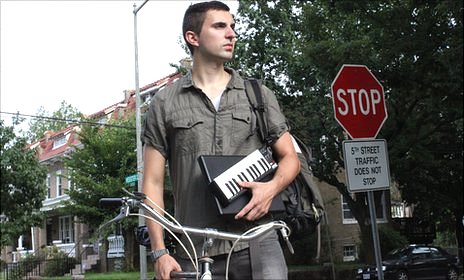21st Century Minimalism

27-year-old American Chris Yurista (Chris Yurista) says that digital files are more important to him than physical property. He sold the apartment, furniture and the rest of the trash. All his fashionable clothes fit in a backpack, and Chris himself found true freedom - he can go anywhere and work anywhere. The main thing is that there was a bicycle, a laptop and a small keyboard of a digital piano nearby.
The guy makes good money as a DJ in Washington, and also earns money as a travel agent, and he has a very good bank account, which only grows from such a minimalistic lifestyle. The total value of his physical liabilities is only $ 3,000, and he turned everything else into assets that he manages through online banking.
In addition, he freed up a lot of time - now you do not need to take care of the house, wipe off dust, take out garbage, repair broken things and so on. He usually sleeps with friends.
In this new life, the biggest concern is the reliability of the hard drive. Your whole life depends on it, so backing up is the most important issue. American psychologists say that the first cases of suicide are already registered in the United States, when people lost all their files.
The virtual world is taking an increasingly important place in our lives, so the value of offline artifacts is declining quite naturally. If we spend most of our time online, then what difference does our apartment look like, in what city is it, what kind of furniture is it? The main thing is that the Internet channel is fast and the electricity works without interruptions. So in fact, no matter where to live.
Chris Lawyer is not the only case, this is a real trend . 22-year-old programmer Kelly Sutton also sold all of his property except an iPad, Kindle, laptop, two external drives for backup and a couple of other things, and then rented a room in Brooklyn. He founded CultofLess.com, which helps like-minded people get rid of property and gain the freedom of true digital minimalism.
According to Sutton, a variety of web services and digital media, including iTunes, Hulu, Flickr, Facebook, Skype and Google Maps, completely replace him with the offline world. He leads a full life, working and relaxing in digital format.
A similar story is with Joshua Klein, a New York-based technology innovation consultant. He and his wife sold two-thirds of their property, transferred a lot to digital form and went literally to live on the street for nine months.
According to Dr. Sandberg of the Future of Humanity Institute, the idea of digital minimalism is a transitional step towards a digital form of the existence of the human mind. According to him, if in the future the human consciousness can be copied to a computer, then a person can continue to watch movies, listen to MP3s, read electronic books and communicate on social networks in the same way as before.
via bbc
